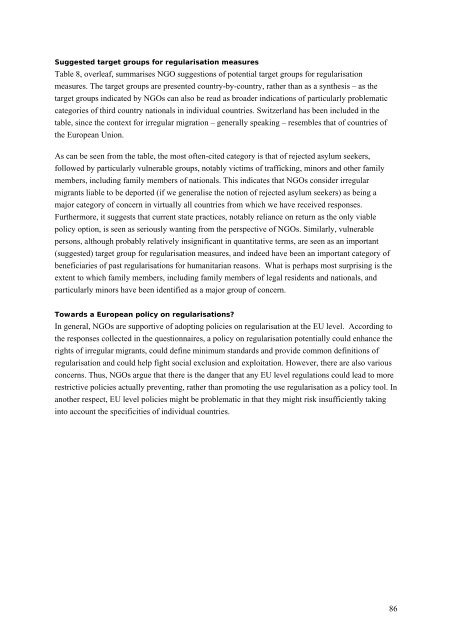REGINE Regularisations in Europe Final Report - European ...
REGINE Regularisations in Europe Final Report - European ...
REGINE Regularisations in Europe Final Report - European ...
Create successful ePaper yourself
Turn your PDF publications into a flip-book with our unique Google optimized e-Paper software.
Suggested target groups for regularisation measures<br />
Table 8, overleaf, summarises NGO suggestions of potential target groups for regularisation<br />
measures. The target groups are presented country-by-country, rather than as a synthesis – as the<br />
target groups <strong>in</strong>dicated by NGOs can also be read as broader <strong>in</strong>dications of particularly problematic<br />
categories of third country nationals <strong>in</strong> <strong>in</strong>dividual countries. Switzerland has been <strong>in</strong>cluded <strong>in</strong> the<br />
table, s<strong>in</strong>ce the context for irregular migration – generally speak<strong>in</strong>g – resembles that of countries of<br />
the <strong>Europe</strong>an Union.<br />
As can be seen from the table, the most often-cited category is that of rejected asylum seekers,<br />
followed by particularly vulnerable groups, notably victims of traffick<strong>in</strong>g, m<strong>in</strong>ors and other family<br />
members, <strong>in</strong>clud<strong>in</strong>g family members of nationals. This <strong>in</strong>dicates that NGOs consider irregular<br />
migrants liable to be deported (if we generalise the notion of rejected asylum seekers) as be<strong>in</strong>g a<br />
major category of concern <strong>in</strong> virtually all countries from which we have received responses.<br />
Furthermore, it suggests that current state practices, notably reliance on return as the only viable<br />
policy option, is seen as seriously want<strong>in</strong>g from the perspective of NGOs. Similarly, vulnerable<br />
persons, although probably relatively <strong>in</strong>significant <strong>in</strong> quantitative terms, are seen as an important<br />
(suggested) target group for regularisation measures, and <strong>in</strong>deed have been an important category of<br />
beneficiaries of past regularisations for humanitarian reasons. What is perhaps most surpris<strong>in</strong>g is the<br />
extent to which family members, <strong>in</strong>clud<strong>in</strong>g family members of legal residents and nationals, and<br />
particularly m<strong>in</strong>ors have been identified as a major group of concern.<br />
Towards a <strong>Europe</strong>an policy on regularisations?<br />
In general, NGOs are supportive of adopt<strong>in</strong>g policies on regularisation at the EU level. Accord<strong>in</strong>g to<br />
the responses collected <strong>in</strong> the questionnaires, a policy on regularisation potentially could enhance the<br />
rights of irregular migrants, could def<strong>in</strong>e m<strong>in</strong>imum standards and provide common def<strong>in</strong>itions of<br />
regularisation and could help fight social exclusion and exploitation. However, there are also various<br />
concerns. Thus, NGOs argue that there is the danger that any EU level regulations could lead to more<br />
restrictive policies actually prevent<strong>in</strong>g, rather than promot<strong>in</strong>g the use regularisation as a policy tool. In<br />
another respect, EU level policies might be problematic <strong>in</strong> that they might risk <strong>in</strong>sufficiently tak<strong>in</strong>g<br />
<strong>in</strong>to account the specificities of <strong>in</strong>dividual countries.<br />
86
















